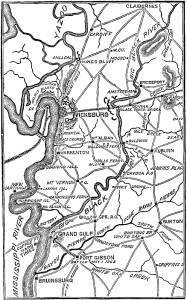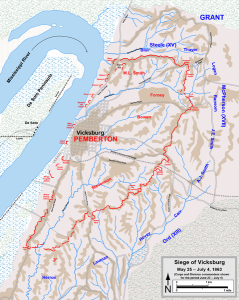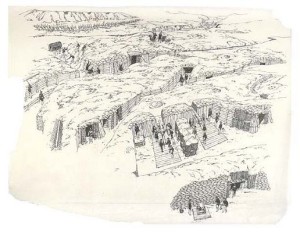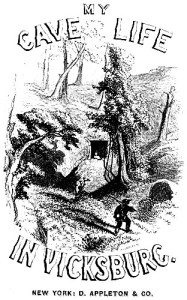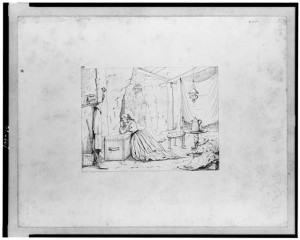150 years ago tomorrow The New York Times published a huge article that put together many dispatches from besieged Vicksburg. The reports contained misinformation (General Grant announcing to his troops that Port Hudson had fallen), but the main themes were that the Union army kept digging its way closer to the rebel lines and that food inside the rebel lines was getting extremely scarce. Civilians were getting damaged by the federal fire. Predictions that the rebels could not possibly hold out beyond July 4th.
From The New-York Times July 3, 1863:
THE SIEGE OF VICKSBURGH; Demonstrations of Joe Johnston in the Rear. In Attack on Gen. Osterhans at the Big Black. The Enemy Repulsed with Great Slaughter. Progress of Our Approaches to the City. NEWS RECEIVED IN ST. LOUIS. TELEGRAMS TO THE WESTERN PRESS.
[RE]AR OF VICKSBURGH, Wednesday, June 24, 1863.
Up to yesterday skirmishing has been going on along the whole line of our rear front, or rather that portion of it from Snyder’s Bluff to the Big Black Railroad crossing. There being every indication of a fight immineat, the rear front was put in order to resist an assault. …
ST. LOUIS, Thursday, July 2.
The Vicksburgh correspondent of the Democrat says that the conduct of the troops during the operations in LOGAN’s front, on the 25th, was very brilliant. As soon as the mine exploded, the Forty-fifth Illinois, led by Col. MALTBIE, rushed into the breach and planted the flag amid a terrific fire from the enemy. …
Dispatch to the Chicago Tribune.
CHICKASAW BAYOU, June 22, Via CALRO, June 29, 1863.
I have just returned from a tour of inspection along SHERMAN’s and MCPHERSON’s front. SHERMAN still creeping up to the left. BLAIR’s division is sapping it at three points. Gen. GILES SMITH is on the left. Gen. EWING in front, and Gen. LIGHTBURN on the sight. In each of these approaches the same breast works serve for the rebels and for us. Gen. BROCKLAND, of TUTTLES division, is also approaching very near.
An unusually sharp attack was made by the enemy on. BLAIR’s approaches this morning, but without effect.
The rebels yesterday threw over into BLAIR’s trenches a copy of the Vicksburgh Whig of Saturday, printed on wall paper. It admitted that the cannonading on that morning did much Carnage among the women and children.
Gen. MCARTHUR’s works are being pushed steadily forward. Not an hour, not a minute is lost. This digging is not fortifying but approaching
RA[NS]OM’s men have gone forward a rod to-day, amid a concentrated fire from the rebel sharpshooters, while a ten-gun fort, just being completed, due during the week, will probably open fire on the rebels to-morrow. This fort is a horizontal line, ahead of all other works. LOGAN’s approach has entered the large key-fort of the rebels, piercing nearly to the inner base of their intrenchments, and two 30-pound Parrotis have been planted upon the rebel intrenchments, just under the crest, this side, and are doing fearful execution. One last evening silenced a gun of in enemy’s which had beet annoying SHERMAN’s batteries.
Under cover of these two guns and our sharpshooters, LOGAN’s pioneer corps is cutting a traverse inside the big fort, thus gaining; 2 position from which the reduction of the entire fort must necessarily be effected.
A rebel sergeant escaped into our lines on Saturday, who proved to be one of the two spies sent into Vicksburgh, over a year ago, by Admiral PORTER. The other was hung, and this one enlisted, and has served the rebels faithfully up to this time, to avoid the same fate. He has of late bad charge of a gapping and mining party, and seems well posted in regard to the position of the enemy’s wor[k]s. He says their redoubts and bastions are all undermined, with trains laid ready to be h[???]ed the moment we gain possession of them. The rebels also have sewers and pitfalls covering the ways by which our troops must approach the city. He says they have provisions to last from ten to fifteen days longer, and plenty of ammunition with the exception of caps, and have lately been casting ordnance. According to [his] story, and our officers are disposed to believe it, it is a moral impossibility for Vicksburgh to hold out over a fort-night longer. …
There is a general feeling this morning along the lines, among intelligent and influential officers, that though an immediate crisis is not as probable as on Saturday, yet that Vicksburgh will be ours before the 4th of July. No one is willing to put it off a day beyond that time. …
Dispatch to the Cincinnati Gazette.
CHICKASAW BAYOU, June 24, vi[a] CAIRO, June [???]. …
There is intelligence at GRANT’s headquarters this morning, of a mutiny in progress in Vicksburgh, probably reliable.
Dispatches to the Chicago Times. …
An advance of cavalry, under Maj. GRANT WILSON, entered Mechanicsville, and drove off twice their number of rebel horsemen, capturing twelve prisoners and thirty horses. They brought in a herd of 400 horses and 200 mules, which had been gathered for JOHNSTON’s army. Several thousand bushels of corn were also destroyed.
The best information states that JOHNSTON is concentrating at Canton with 12.000 men. He is believed to be preparing for an advance on Memphis or Port Hudson. Not a fear is entertained of his efforts in this direction.
An intelligent deserter from Vicksburgh says that the rebels are using powder from our unexploded shells, Gen. PEMBERTON paving $6 a pound for it. Mortar shells are being cast also from our fragments. The men are on one-third rations, and complaining. Two regiments are said to have laid down their arms in mutiny. On receiving assurance from Gen. PEMBERTON and JOHNSTON would attack next day, they retook their muskets.
MEMPHIS, Saturday, June 27.
On the 24th It was reported that JOHNSTON was at Chickasaw Bayou with his army, and only seven miles from our lines.
On the 25th Gen. GRANT issued an order, which was read to his troops, to the effect that Port Hudson was captured, with 8,000 prisoners.
When the Champion left a battle was raging with fury between JOHNSTON and OSTERHAUS at the Big Black and Champion Hills. It is reported that JOHNSTON had 50,000 men, and is being reinforced.
In the direction of Snyder’s Bluff the rebels at-tempted to cut their way out on Monday, but were re[pul]sed. On Tuesday morning the rebels turned loose about 600 horses and mules into our lines. Most of them are nearly dead with starvation. On the same day a large number of cats and dogs were thrown into the rifle pits. …
In My Cave Life in Vicksburg (1864) Mary Ann Loughborough stressed the themes of hunger and the damage from the Union shelling. Here’s some extracts.
One morning, after breakfast, the shells began falling so thickly around us, that they seemed aimed at the particular spot on which our cave was located. Two or three fell immediately in therear of it, exploding a few moments before reaching the ground, and the fragments went singing over the top of our habitation. I, at length, became so much alarmed—as the cave trembled excessively—for our safety, that I determined, rather than be buried alive, to stand out from under the earth; so, taking my child in my arms, and calling the servants, we ran to a refuge near the roots of a large fig tree, that branched out over the bank, and served as a protection from the fragments of shells. As we stood trembling there—for the shells were falling all around us—some of my gentlemen friends came up to reassure me, telling me that the tree would protect us, and that the range would probably be changed in a short time. While they spoke, a shell, that seemed to be of enormous size, fell, screaming and hissing, immediately before the mouth of our cave, within a few feet of the entrance, sending up a huge column of smoke and earth, and jarring the ground most sensibly where we stood. What seemed very strange, the earth closed in around the shell, and left only the newly upturned soil to show where it had fallen. [page 67]
Even the very animals seemed to share the general fear of a sudden and frightful death. The dogs would be seen in the midst of the noise to gallop up the street, and then to return, as if fear had maddened them. On hearing the descent of a shell, they would dart aside—then, as it exploded, sit down and howl in the most pitiful manner. There were many walking the street, apparently without homes. George carried on a continual warfare with them, as they came about the fire where our meals were cooking.
In the midst of other miserable thoughts, it came into my mind one day, that these dogs through hunger might become as much to be dreaded as wolves. Groundless was this anxiety, for in the course of a week or two they had almost disappeared.
The horses, belonging to the officers, and fastened to the trees near the tents, would frequently strain the halter to its full length, rearing high in the air, with a loud snort of terror, as a shell would explode near. I could hear them in the night cry out in the midst of the uproar, ending in a low, plaintive whinny of fear.
The poor creatures subsisted entirely on cane tops and mulberry leaves. Many of the mules and horses had been driven outside of the lines, by order of General Pemberton, for subsistence. Only mules enough were left, belonging to the Confederacy, to allow three full teams to a regiment. Private property was not interfered with.
Sitting in the cave, one evening, I heard the most heartrending screams and moans. I was told that a mother had taken a child into a cave about a hundred yards from us; and having laid it on its little bed, as the poor woman believed, in safety, she took her seat near the entrance of the cave. A mortar shell came rushing through the air, and fell with much force, entering the earth above the sleeping child—cutting through into the cave—oh! most horrible sight to the mother—crushing in the upper part of the little sleeping head, and taking away the young innocent life without a look or word of passing love to be treasured in the mother’s heart. [pages 78-80]
Already the men in the rifle pits were on half rations—flour or meal enough to furnish bread equivalent in quantity to two biscuits in two days: many of them ate it all at once, and the next day fasted, preferring, as they said, to have one good meal. [page 106]
A certain number of mules are killed each day by the commissaries, and are issued to the men, all of whom prefer the fresh meat, though it be of mule, to the bacon and salt rations that they have eaten for so long a time without change. There have already been some cases of scurvy: the soldiers have a horror of the disease; therefore, I suppose, the mule meat is all the more[Pg 117] welcome. Indeed, I petitioned M—— to have some served on our table. He said: “No; wait a little longer.” He did not like to see me eating mule until I was obliged to; that he trusted Providence would send us some change shortly. [pages 116-117]

